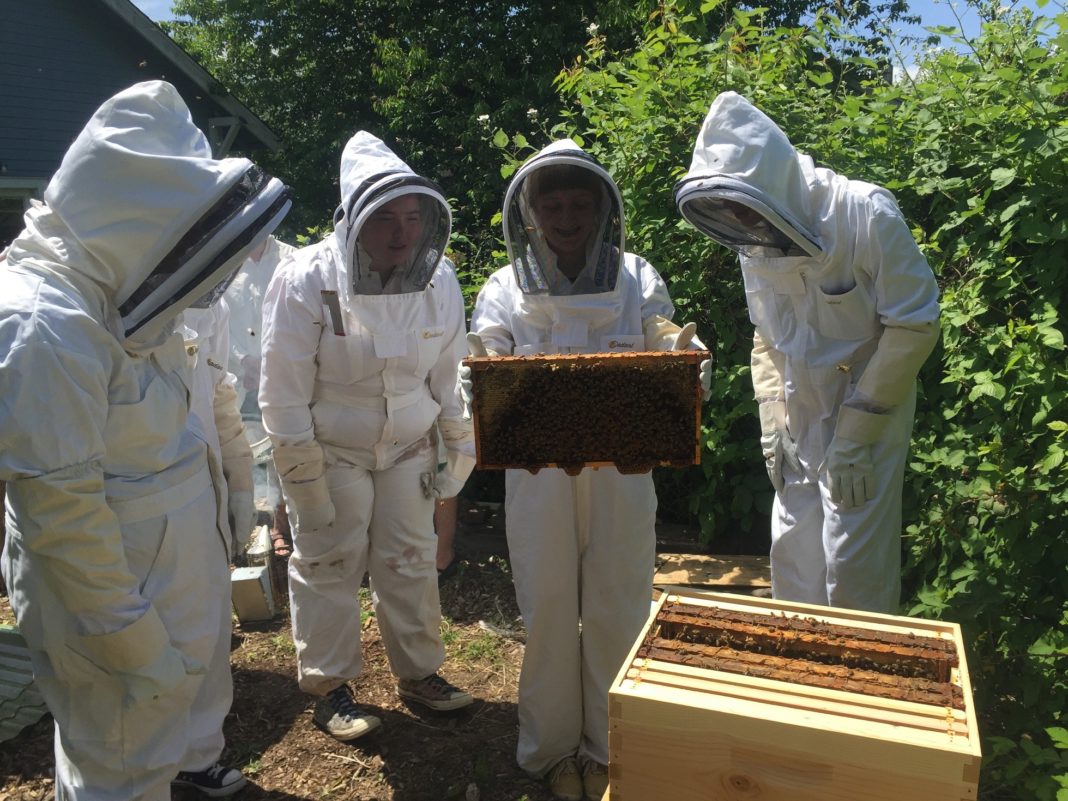Honeybees face an uncertain future. Over the last several decades, population numbers have fallen due to disease, colony collapse disorder, and widespread pesticide use. Another threat honeybees face is the loss of one of their biggest allies, the apiarist. Commonly referred to as beekeepers, apiarists are made up of an aging population. With fewer young people interested in the hobby, generations of knowledge and the fate of the bees are at stake. Annie Pocklington, graduate student at The Evergreen State College, is trying to change that.
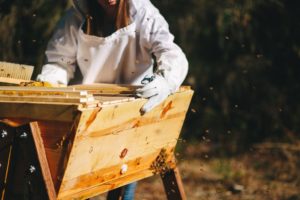
Annie is a part of the new wave of young apiarists. She began beekeeping three years ago with the support of her uncle and the Olympia Beekeepers Association, a non-profit organization that provides education, training, and support for beekeepers in Thurston County. “Any question or needs I have are always answered there,” she says. Increasing education about bees is one of the ways to help the struggling population and encourage others to get involved with beekeeping. At Evergreen, Annie often found ways to work beekeeping into assignments, writing about policy and pesticide use.
Annie knew when she started working on her capstone project, a final project demonstrating the skills and abilities she gained in the Masters of Public Administration (MPA) program at Evergreen, that she wanted to find a way to work in her love of beekeeping. An idea began to take shape. Annie sought out the help of Doreen Swetkis, her capstone mentor and the MPA director at Evergreen. Doreen supported Annie with encouragement and ideas on how to incorporate beekeeping into her project. With her mentor’s support, Annie decided she would approach the Olympia School District with the idea of bringing a beehive to a local high school. “The biggest challenge I faced was putting the project together and get it going within a 10 week timeframe,” Annie explains.
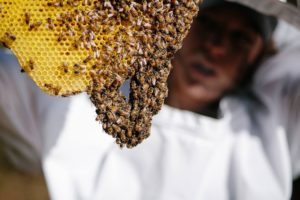
She reached out to Avanti High School’s Urban Agriculture teacher, Quasar Surprise, about forming a beekeeping club where the high schoolers could learn about the care of bees and their importance to the food chain and the environment. Quasar was immediately supportive. With a class selected, the work to gather supplies and equipment began.
“In beekeeping, the sweetness comes before the honey,” Annie says. Honey is our first connection to bees because it is the physical tangible thing that they provide for us, but there is so much more, especially when you are teaching, learning, and sharing with the bees. “The best part of this project has been the amazing support from so many in the community,” she adds.
The Woods Family of Centralia has been greatly involved in advancing education about bees. They donated a hive to Annie to help her with her project. Local community member and Evergreen teacher, Michi Thacker, housed the bees on her property, close to Avanti High School. “I strive to be like Michi,” says Annie, “a project like this comes up, and she is just willing to help out.”
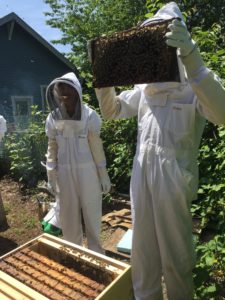
A regular component of beekeeping is the hive inspection. During a hive inspection, the beekeeper checks on a number of things. They look at the queen, check on pollen and honey stores, and other things which signify a healthy hive. After the students learned about what to look for in the hive, they suited up to put the knowledge into practice.
“There was a wonderful movement after the first hive inspection when the kids were all very excited, and one of the kids said, ‘we just experienced a once in a lifetime moment!’” says Annie. “I was so happy to get to tell them they get to do a hive inspection every week. Beekeeping doesn’t have to be a one-time thing.” She hopes that this club will only be the beginning for the students. She imagines the club will continue and she plans to stay involved with the program she has created after she graduates.
Student support for the club has been overwhelmingly positive. Annie says that there is a regular group of students that uses their own after school time to be a part of the beekeeping club. Seeing their dedication has made her optimistic about the future of beekeeping within the school district and within the area. Education and mentorship are the best ways to get the public, and especially youth, involved in helping the bees, she says.
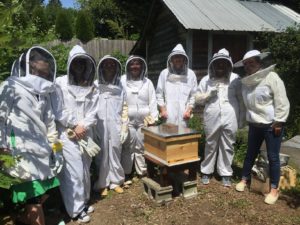
Annie knows not everyone will decide to keep bees in their backyard, but there are plenty of other ways people can help. You can plant bee-friendly flowers and herbs. Moss gardens are great because they hold water for thirsty bees, or put out a shallow bird bath for them – change the water frequently to keep away mosquitos.
The graduate programs at The Evergreen State College encourage students to shape their interests into their educations, gathering skills, and deepening their understandings of the worlds around them. To learn more about the graduate programs offered, visit The Evergreen State College website.
Sponsored






































